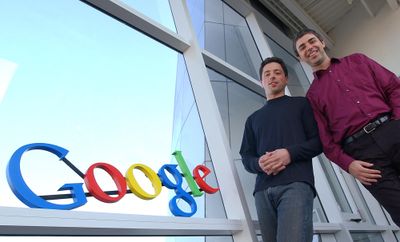Grown-up Google faces challenges
Monopoly concerns force Web giant to adopt new strategies

MOUNTAIN VIEW, Calif. — When Larry Page and Sergey Brin founded Google Inc. on Sept. 7, 1998, they had little more than their ingenuity, four computers and an investor’s $100,000 bet on their belief that an Internet search engine could change the world.
It sounded preposterous 10 years ago, but look now: Google draws upon a gargantuan computer network, nearly 20,000 employees and a $150 billion market value to redefine media, marketing and technology.
Perhaps Google’s biggest test in the next decade will be finding a way to pursue its seemingly boundless ambitions without triggering a backlash that derails the company.
“You can’t do some of the things that they are trying to do without eventually facing some challenges from the government and your rivals,” said Danny Sullivan, who has followed Google since its inception and is now editor-in-chief of SearchEngineLand.
Google’s expanding control over the flow of Internet traffic and advertising already is raising monopoly concerns.
The intensifying regulatory and political scrutiny on Google’s expansion could present more roadblocks in the future. Even now, there’s a chance U.S. antitrust regulators will challenge Google’s plans to sell ads for Yahoo Inc., a fading Internet star whose recent struggles have been magnified by Google’s success.
Privacy watchdogs also have sharpened their attacks on Google’s retention of potentially sensitive information about the 650 million people who use its search engine and other Internet services like YouTube, Maps and Gmail. If the harping eventually inspires rules that restrict Google’s data collection, it could make its search engine less relevant and its ad network less profitable.
To protect its interests, Google has hired lobbyists to bend the ears of lawmakers and ramped up its public relations staff to sway opinion as management gears up to conquer new frontiers.
“Google will keep pushing the envelope,” predicted John Battelle, who wrote a book about the company and now runs Federated Media, a conduit for Internet publishers and advertisers. “It’s one of the things that seems to make them happy.”
In the latest example of its relentless expansion, Google has just released a Web browser to make its search engine and other online services more accessible and appealing. Not every peripheral step has gone smoothly, though; several of the company’s ancillary products have flopped or never lived up to the hype.
Extending Google’s ubiquity to cell phones and other mobile devices sits at the top of management’s agenda for the next decade.
But the lengthy to-do list also includes: making digital copies of all the world’s books; establishing electronic file cabinets for health records; leading the alternative energy charge away from fossil fuels; selling computer programs to businesses over the Internet; and tweaking its search engine so it can better understand requests stated in plain language, just like a human would.
“There are people who think we are plenty full of ourselves right now, but from inside at least, it doesn’t look that way,” said Craig Silverstein, Google’s technology director and the first employee hired by Page and Brin. “I think what keeps us humble is realizing how much further we have to go.”
Page and Brin, both 35 now and worth nearly $19 billion apiece, declined to be interviewed. But they have never left any doubt they view Google as a force for good — a philosophy punctuated by their corporate motto: “Don’t Be Evil.”
“If we had a light saber, we would be Luke (Skywalker),” Silverstein said.
A “Star Wars” analogy can just as easily be used to depict Google as an imposing empire. It holds commanding leads in both the Internet search and advertising markets. The company processes nearly two-thirds of the world’s online search requests, according to the research firm comScore Inc., and sells about three-fourths of the ads tied to search requests, according to another firm, eMarketer Inc.
The dominance has enabled Google to rake in $48 billion from Internet ads since 2001. Google hasn’t hoarded all of that money: the company has paid $15 billion in commissions to the Web sites that run its ads during the same period, helping to support major online destinations like AOL, Ask.com and MySpace.
“Google is the oxygen in this ecosystem,” Battelle said.
The company hopes to inhale even more Internet advertising from the biggest deal in its short history — a $3.2 billion acquisition of online marketing service DoubleClick Inc. that was completed six months ago.
Google also is trying to mine more money from its second-largest acquisition, YouTube, the Internet’s leading video channel. YouTube is expected to generate about $200 million in revenue this year, an amount that analysts believe barely scratches the video site’s moneymaking potential.